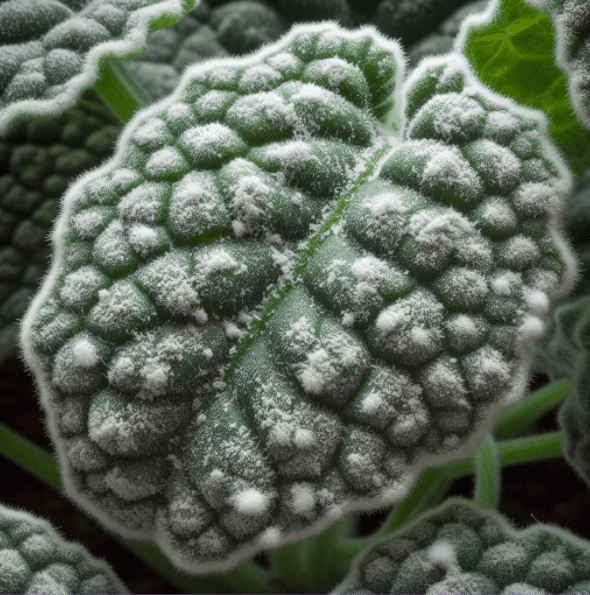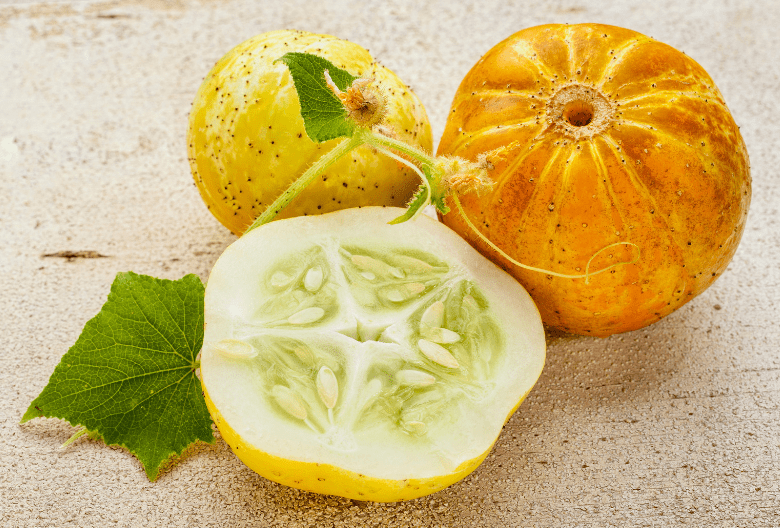
Powdery mildew on lemon cucumbers is a common issue but easily managed with organic solutions. Learn how to control this disease and protect your plants.
Lemon cucumbers are a beloved addition to any vegetable garden with their delightful tangy flavor and refreshing crunch. However, like many plants, they can fall victim to powdery mildew. This fungal disease can quickly dampen your harvest dreams if left unchecked. Organic solutions are readily available to keep your lemon cucumbers healthy and thriving.
What is Powdery Mildew?
Powdery mildew is caused by various fungal species that flourish in a surprising range of conditions, including humid and dry environments. The telltale sign is a white or gray powdery coating on your lemon cucumbers’ leaves, stems, and occasionally fruit. Left untreated, it can stunt plant growth, reduce yields, and even lead to plant death.
Preventing Powdery Mildew on Lemon Cucumbers
A proactive approach is your best defense against powdery mildew. Here’s how to create conditions that discourage this pesky fungus:
-
Plant Spacing for Air Circulation
Proper spacing ensures good airflow around your lemon cucumbers. This helps keep humidity levels low, creating a less hospitable environment for powdery mildew spores.
-
Watering Wisely
Constantly water your lemon cucumbers at the base of the plant, avoiding wetting the foliage. Wet leaves encourage fungal growth. Watering early in the morning allows excess moisture to evaporate throughout the day.
-
Disease-Resistant Lemon Cucumber Varieties
If available, choose lemon cucumber varieties that boast resistance to powdery mildew. This simple step can significantly reduce your risk of battling this disease.
-
Garden Hygiene
At the end of the growing season, remove all plant debris. Fungal spores can overwinter on dead plant matter, increasing the risk of re-infection the following year.

Organic Treatments for Powdery Mildew
Even with careful prevention, powdery mildew can still appear. Swift action with organic treatments is essential. Here are some highly effective options:
Baking Soda Solution
Mix one tablespoon of baking soda with 1 gallon of water and a few drops of liquid soap (this helps the solution stick to the leaves). Spray generously on affected areas weekly. Baking soda creates an alkaline environment on the leaf surfaces, inhibiting fungal growth.
Milk Spray
Milk possesses surprising antifungal properties. Dilute milk with water in a 1:2 ratio and spray your lemon cucumber plants in the morning on a sunny day. This allows the mixture to work and effectively dry on the leaves.
Neem Oil
Neem oil is a naturally derived fungicide. Follow the label instructions for dilution and application. Neem oil can also be used as a preventative measure when applied regularly.
Garlic Extract
Make a natural fungicide by blending two cloves of garlic with two cups of water. Strain the mixture and spray liberally on affected plants.
Additional Organic Treatments
For gardeners seeking even more options, here are a couple of practical, but less commonly discussed organic treatments for powdery mildew:
-
Sulfur: This natural fungicide can be effective against powdery mildew. Be sure to follow product label instructions for application, as sulfur can potentially damage plants in very hot weather.
-
Compost Tea: Compost tea is a nutrient-rich solution that can boost plant health and help suppress fungal growth. To make compost tea, steep finished compost in water for several days, then dilute the solution and spray it on affected plants.
Additional Tips for Success
Early Detection is Key
Regularly inspect your lemon cucumbers for any white, powdery spots. Catching powdery mildew early makes it much easier to control.
Remove Infected Parts
Prune away and dispose of any infected leaves or stems to prevent the disease from spreading to healthy parts of the plant.
Harness the Power of Sunlight
Plant your lemon cucumbers in a location that receives full sun. Sunlight helps keep foliage dry and less hospitable to powdery mildew.
Frequently Asked Questions about Powdery Mildew
-
Is powdery mildew harmful to humans? No, powdery mildew is a plant-specific fungal disease and poses no risk to human health.
-
Can I still eat cucumbers with powdery mildew? If the infection is very slight, you can carefully remove the powdery mildew spots and eat the cucumber. However, heavily infected cucumbers should be discarded to prevent the disease from spreading.
-
What causes powdery mildew on cucumbers? Powdery mildew is caused by various fungal species that thrive in warm conditions, often with fluctuations between humidity and dryness.
-
What does powdery mildew look like on cucumbers? It appears as distinctive white, powdery spots that start on the leaves and can spread to the stems and cucumbers.
-
How can I prevent and treat powdery mildew on my cucumber plants?
- Prevention: Ensure good air circulation around plants, water at the soil level, and choose resistant varieties if available.
- Treatment: Organic solutions like baking soda sprays, milk sprays, neem oil, and garlic extract are effective and safe for your garden.
Conclusion
You can successfully manage powdery mildew using organic methods and ensure a bountiful harvest of delicious lemon cucumbers. Remember, a healthy garden with good airflow, proper watering, and preventative care is the best defense against this common plant disease. Enjoy the fruits of your labor!
Last update on 2024-07-26 / Affiliate links / Images from Amazon Product Advertising API

























